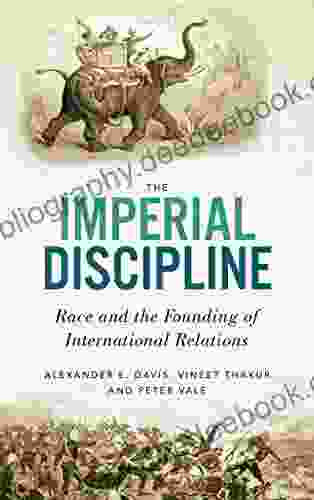Race and the Foundation of International Relations: Uncovering the Intersecting Histories

The study of international relations (IR) has traditionally focused on the interactions between states, with little attention paid to the role of race. This article challenges this narrow perspective by exploring the profound influence that race has had on the development of IR as a discipline. We argue that race is not simply a factor that can be added on to existing theories of IR, but rather a fundamental organizing principle that has shaped the way we think about and practice international politics.
5 out of 5
| Language | : | English |
| File size | : | 918 KB |
| Text-to-Speech | : | Enabled |
| Screen Reader | : | Supported |
| Enhanced typesetting | : | Enabled |
| Word Wise | : | Enabled |
| Print length | : | 208 pages |
| X-Ray for textbooks | : | Enabled |
We begin by tracing the historical roots of race in IR, showing how it has been used to justify colonialism, imperialism, and other forms of domination. We then examine the ways in which race continues to shape contemporary IR, both in terms of the theories that we use and the policies that we adopt. Finally, we offer some suggestions for how we can move beyond a race-centric understanding of IR and create a more just and equitable world.
The Historical Roots of Race in IR
The concept of race has its origins in the 15th century, when European explorers began to encounter people from other parts of the world. These encounters were often marked by violence and exploitation, and Europeans quickly developed a system of racial hierarchy to justify their domination over other peoples.
This system of racial hierarchy was based on the idea that white Europeans were superior to all other races. This belief was used to justify the colonization of Africa, Asia, and the Americas, as well as the enslavement of millions of people of color.
The ideas of racial superiority that developed during this period had a profound impact on the development of IR. The first scholars of IR, such as Hugo Grotius and Emmerich de Vattel, were all white Europeans who believed in the superiority of their own race. This belief led them to develop theories of IR that were based on the assumption that white Europeans were the only legitimate actors in international politics.
Race and the Development of IR Theory
The racist assumptions of early IR scholars had a lasting impact on the development of the discipline. For centuries, IR theory was dominated by a Eurocentric perspective that ignored the experiences and perspectives of people of color. This perspective led to the development of theories that were based on the assumption that the world was divided into two distinct spheres: the civilized world of white Europeans and the barbaric world of non-white peoples.
This Eurocentric perspective also led to the development of theories that justified colonialism and imperialism. These theories argued that white Europeans had a duty to "civilize" the non-white world and that colonialism was a necessary step in this process.
The racist assumptions of early IR scholars also had a profound impact on the way that IR was practiced. For centuries, IR was a discipline that was dominated by white men. This led to the exclusion of women and people of color from the field and resulted in a narrow and biased understanding of international politics.
Race and Contemporary IR
In the 20th century, there was a growing challenge to the racist assumptions of early IR scholars. This challenge came from a variety of sources, including the civil rights movement in the United States, the anti-colonial movements in Africa and Asia, and the rise of postcolonial studies.
As a result of these challenges, IR began to move away from its Eurocentric and racist past. However, race continues to play a significant role in contemporary IR, both in terms of the theories that we use and the policies that we adopt.
For example, many of the theories that we use to understand international politics are still based on the assumption that the world is divided into two distinct spheres: the developed world of white Europeans and the developing world of non-white peoples. This assumption leads to a distorted understanding of international politics and makes it difficult to address the challenges that we face in the 21st century.
Similarly, many of the policies that we adopt in the name of IR are still based on racist assumptions. For example, the war on terror is often justified as a necessary step in the fight against terrorism. However, this war has disproportionately targeted Muslims and has resulted in the deaths of thousands of innocent people.
Moving Beyond a Race-Centric Understanding of IR
It is clear that race continues to play a significant role in contemporary IR. However, it is also clear that we need to move beyond a race-centric understanding of IR if we want to create a more just and equitable world. There are a number of ways that we can do this.
First, we need to decolonize our understanding of IR. This means challenging the Eurocentric assumptions that have dominated the discipline for centuries. We need to listen to the voices of people of color and incorporate their experiences and perspectives into our theories and policies.
Second, we need to develop new theories of IR that are not based on racist assumptions. These theories should be more inclusive and should take into account the experiences and perspectives of all people, regardless of their race.
Third, we need to adopt policies that are not based on racist assumptions. These policies should be designed to promote peace, justice, and equality for all people, regardless of their race.
Moving beyond a race-centric understanding of IR will not be easy. However, it is essential if we want to create a more just and equitable world.
Race has had a profound influence on the development of IR as a discipline. From the earliest days of the discipline, race has been used to justify colonialism, imperialism, and other forms of domination. However, in recent years, there has been a growing challenge to the racist assumptions of early IR scholars. This challenge has come from a variety of sources, including the civil rights movement in the United States, the anti-colonial movements in Africa and Asia, and the rise of postcolonial studies.
As a result of these challenges, IR has begun to move away from its Eurocentric and racist past. However, race continues to play a significant role in contemporary IR, both in terms of the theories that we use and the policies that we adopt. It is clear that we need to move beyond a race-centric understanding of IR if we want to create a more just and equitable world.
5 out of 5
| Language | : | English |
| File size | : | 918 KB |
| Text-to-Speech | : | Enabled |
| Screen Reader | : | Supported |
| Enhanced typesetting | : | Enabled |
| Word Wise | : | Enabled |
| Print length | : | 208 pages |
| X-Ray for textbooks | : | Enabled |
Do you want to contribute by writing guest posts on this blog?
Please contact us and send us a resume of previous articles that you have written.
 Book
Book Novel
Novel Page
Page Chapter
Chapter Text
Text Genre
Genre E-book
E-book Magazine
Magazine Newspaper
Newspaper Paragraph
Paragraph Sentence
Sentence Bookmark
Bookmark Shelf
Shelf Bibliography
Bibliography Preface
Preface Annotation
Annotation Footnote
Footnote Bestseller
Bestseller Classics
Classics Library card
Library card Narrative
Narrative Biography
Biography Autobiography
Autobiography Memoir
Memoir Encyclopedia
Encyclopedia Dictionary
Dictionary Thesaurus
Thesaurus Resolution
Resolution Librarian
Librarian Card Catalog
Card Catalog Research
Research Lending
Lending Academic
Academic Journals
Journals Rare Books
Rare Books Special Collections
Special Collections Interlibrary
Interlibrary Thesis
Thesis Dissertation
Dissertation Textbooks
Textbooks Angus Donald
Angus Donald Robert Louis Stevenson
Robert Louis Stevenson Katy Colins
Katy Colins Sarah Waldock
Sarah Waldock Regpub
Regpub Kennice Reid
Kennice Reid Charles Magnin
Charles Magnin Sugiyoshi Yuji
Sugiyoshi Yuji Geri Krotow
Geri Krotow Kurt A Knoth
Kurt A Knoth Kirby Tribe
Kirby Tribe Maggie Shipstead
Maggie Shipstead Thomas Knauff
Thomas Knauff Callum Laing
Callum Laing Joseph Panno
Joseph Panno Ben Dror Yemini
Ben Dror Yemini Susan Blumenthal
Susan Blumenthal Gadi Wolfsfeld
Gadi Wolfsfeld Gary Northfield
Gary Northfield Edward J Barss
Edward J Barss
Light bulbAdvertise smarter! Our strategic ad space ensures maximum exposure. Reserve your spot today!

 Jonathan FranzenHow To Perform Successful Sales Calls: A Comprehensive Guide To Mastering The...
Jonathan FranzenHow To Perform Successful Sales Calls: A Comprehensive Guide To Mastering The... Hayden MitchellFollow ·5.6k
Hayden MitchellFollow ·5.6k Joel MitchellFollow ·8.6k
Joel MitchellFollow ·8.6k Jeffery BellFollow ·10.2k
Jeffery BellFollow ·10.2k Carson BlairFollow ·16.6k
Carson BlairFollow ·16.6k Jake CarterFollow ·17k
Jake CarterFollow ·17k Leo TolstoyFollow ·17.7k
Leo TolstoyFollow ·17.7k Guillermo BlairFollow ·19.4k
Guillermo BlairFollow ·19.4k William PowellFollow ·8.8k
William PowellFollow ·8.8k

 Braden Ward
Braden WardFeminism's Forgotten Fight: The Ongoing Battle for...
The feminist movement has historically...

 Julio Cortázar
Julio CortázarBlue Heaven Black Night: A Literary Journey Through Love,...
In the realm of...

 Eddie Bell
Eddie BellA Journey Through Time: Exploring the Enchanting World of...
The vibrant tapestry of New...

 Lawrence Bell
Lawrence BellValiance Dragon Soul Press Anthology: A Literary Odyssey...
Step into a realm where...

 Aron Cox
Aron CoxEmbark on a Creative Odyssey with Jean Leinhauser's "101...
Unveil a Kaleidoscope of...
5 out of 5
| Language | : | English |
| File size | : | 918 KB |
| Text-to-Speech | : | Enabled |
| Screen Reader | : | Supported |
| Enhanced typesetting | : | Enabled |
| Word Wise | : | Enabled |
| Print length | : | 208 pages |
| X-Ray for textbooks | : | Enabled |












